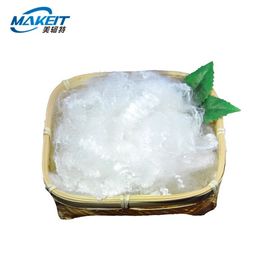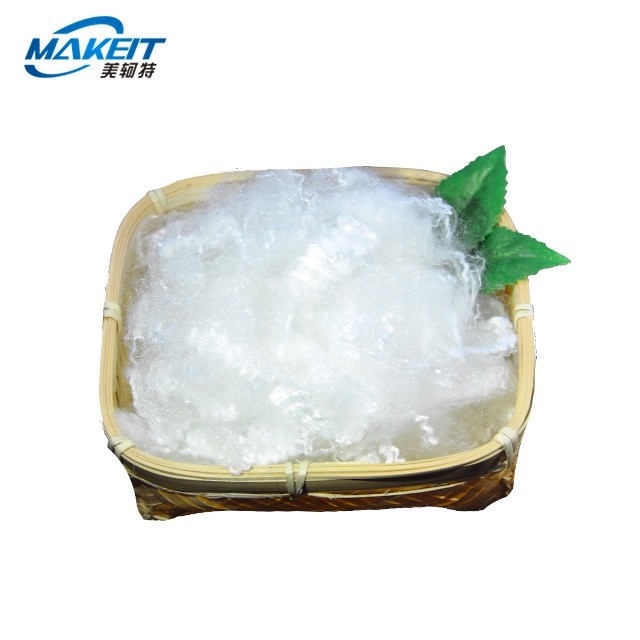1.4D Polyester Staple Fiber For Filling Toy Sofa Hollow Conjugated
1.4d*38mm Non Siliconized Polyester Raw Material Poly Staple Fibre For Spinning
1. Introduce
Fabric type staple fiber:
1. High strength, low elongation, less defects, low crimp, moderate oil content, low dry-heat shrinkage and good spinnability;
2. High quality indicator of fiber- to- yarn, soft and smooth feel, and low irregularity of yarn levelness.
|
Item
|
Polyester Staple Fiber
|
|
Raw Material
|
PET flakes
|
|
Color
|
White, brown, green
|
|
Fineness
|
0.9D, 1.2D, 2.5D, 3D, 7D, 15D
|
|
Cut Length
|
22mm, 25mm, 32mm, 51mm, 64mm
|
|
|
1,1 day for our existing samples for reference
2,3 das, if you want to customize your color
|
|
MOQ
|
10tons/20'GP
|
|
Delivery Time
|
Within 7 days after received down payment or original L/C
|
|
Packing Detailed
|
PP woven bag; 320kg/bale; 20'GP: 10tons, 40'HQ: 23tons
|
|
Production Capacity
|
15000-20000tons per year
|
|
Payment Term
|
T/T or L/C at sight
|
2. Specification
| Name |
Polyester Staple Fibre For Spinning |
| Material |
Virgin Material |
| Denier |
1.4D |
| Length |
38MM |
| Color |
White |
| Features |
Used mixed with wool, Excellent productivity, Cost competitive- ness |
The fabric we now know as polyester began its climb toward its current critical role in the contemporary economy in 1926 as Terylene, which was first synthesized by W.H. Carothers in the UK. Throughout the 1930s and 1940s, British scientists continued to develop better forms of ethylene fabric, and these efforts eventually garnered the interest of American investors and innovators.
Polyester fiber was originally developed for mass consumption by the DuPont Corporation, which also developed other popular synthetic fibers like nylon. During World War II, the Allied powers found themselves in increased need of fibers for parachutes and other war materiel, and after the war, DuPont and other American corporations found a new consumer market for their synthetic materials in the context of the postwar economic boom.
Initially, consumers were enthusiastic about the improved durability profile of polyester compared to natural fibers, and these benefits are still valid today. In recent decades, however, the harmful environmental impact of this synthetic fiber has come to light in great detail, and the consumer stance on polyester has changed significantly.
Nonetheless, polyester remains one of the most widely-produced fabrics in the world, and it’s hard to find consumer apparel that doesn’t contain at least some percentage of polyester fiber. Apparel that contains polyester, however, will melt in extreme heat, while most natural fibers char. Molten fibers can cause irreversible bodily damage.
3. Characteristic index
| |
Strength ( cN/dt )
|
Elongation (%)
|
Dry-heat shrinkage (%)
|
| Special Type for Knitting |
≥5.60 |
25±4 |
5.5±3.0 |
4. Application
Staple fiber of fabric type can be blended with cotton, viscose fiber, etc. or can purely twist spinning to produce various kinds of air-spinning and vortex-spun yarns, such as polyester-cotton, polyester-viscose or pure polyester for various styles of woven and knitted fabric. The fiber of ultra-high-strength type can produce ultra-high strength yarns or can be used as high-strength, wear-resistant fabrics and high-grade fabric.

5. More pictures



 Your message must be between 20-3,000 characters!
Your message must be between 20-3,000 characters! Please check your E-mail!
Please check your E-mail!  Your message must be between 20-3,000 characters!
Your message must be between 20-3,000 characters! Please check your E-mail!
Please check your E-mail! 


